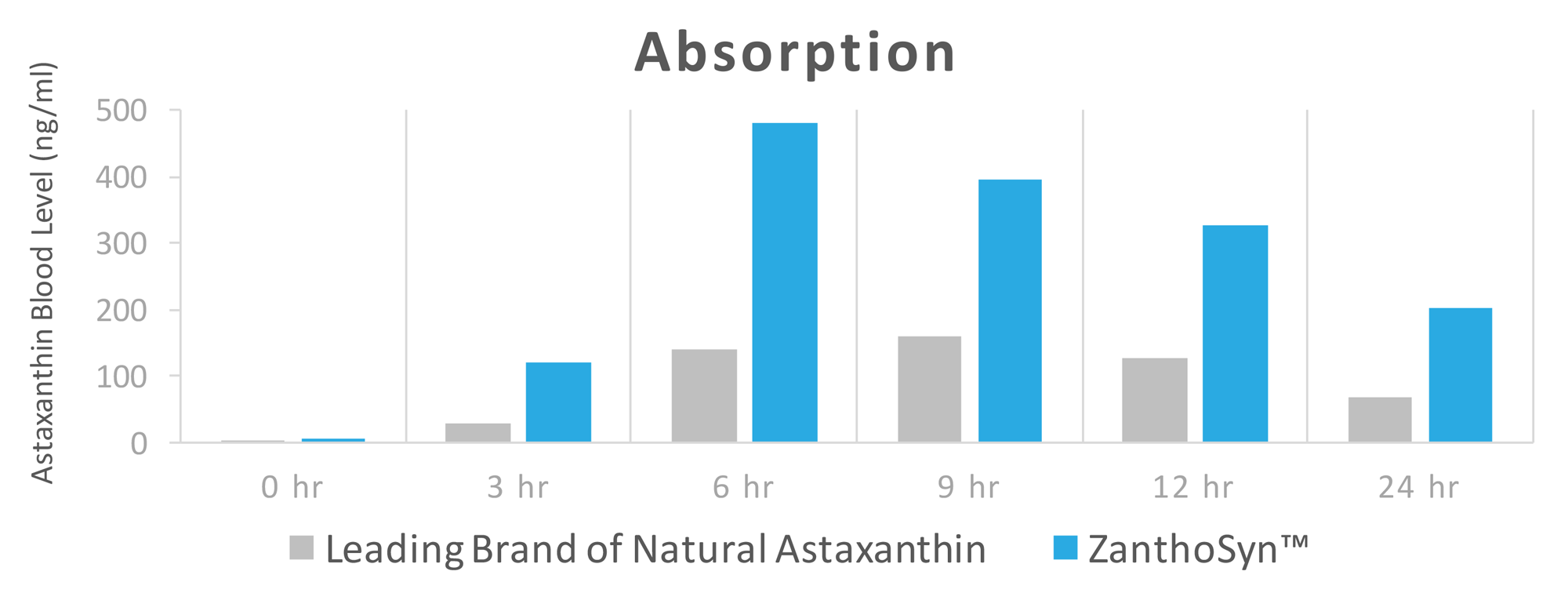About ZanthoSyn
ZanthoSyn® Astaxanthin
ZanthoSyn is a dietary supplement containing astaxanthin, a scientifically studied ingredient that supports overall health, including joint health, heart health, brain health, skin health, eye health, and lifespan.* Astaxanthin is a naturally occurring compound found in algae, krill, salmon, shrimp, and lobster, and can be sourced naturally by extraction from algae, krill, or salmon or manufactured by synthesis in high purity. ZanthoSyn features synthetic astaxanthin in high purity and with superior absorption.
Purity
ZanthoSyn contains pure astaxanthin prepared by natural product total synthesis. In contrast, the astaxanthin extracted from algae and krill oil is obtained in a complex mixture, which may include many unknown marine byproducts. The precision of synthetic manufacturing also provides healthcare professionals and health-conscious consumers with confidence in the quality and consistency of dosing from every capsule. ZanthoSyn is manufactured in accordance with cGMP regulations.
What is Astaxanthin and What are its Health Benefits?
Source: NHK World-Japan
Absorption
In a human study comparing ZanthoSyn to a leading natural astaxanthin product, the astaxanthin blood levels following administration of ZanthoSyn were nearly 3 times higher than the other astaxanthin product at the same dose of 24 mg. This means that two 12 mg capsules of ZanthoSyn deliver nearly the same amount of astaxanthin to the blood stream as six 12 mg capsules of natural astaxanthin. And research studies suggest that higher blood levels of astaxanthin may provide greater health benefits.

Safety
Astaxanthin has been extensively used in animal and human health and has been present in our food chain for thousands of years. The safety of astaxanthin has been well established through the FDA’s process for determining the acceptable daily intake of dietary supplements. The form of astaxanthin utilized in ZanthoSyn is also Generally Recognized as Safe (GRAS) according to FDA regulations.
Mechanism of Action
Astaxanthin has important antioxidant and anti-inflammatory health benefits. After oral ingestion, astaxanthin is transported throughout the body via lipoproteins and localizes in major organs, where it supports cellular and mitochondrial health by protecting lipids, DNA, and proteins from oxidative stress and modulating inflammatory and aging-related cell signaling pathways.*
Joint Health
In human clinical trials, astaxanthin has been shown to significantly reduce markers of inflammation critical to healthy joint function, including TNF-alpha and CRP. Animal studies with astaxanthin also demonstrated reduction in inflammatory mediators and maintenance of joint structure.*
Cardiovascular Health
Astaxanthin localizes in the heart and has been shown to significantly reduce LDL-cholesterol, triglycerides, and blood pressure in human clinical trials, which are critical to maintaining cardiovascular health. Animal studies with astaxanthin have also demonstrated positive effects in models of heart health.*
Liver Health
Astaxanthin is stored in the liver and repackaged for distribution throughout the body. Human clinical trials with astaxanthin have demonstrated benefits in liver health as measured by fat accumulation in the liver. Animal studies also support astaxanthin and liver health.*
Metabolic Health
In human clinical trials, astaxanthin has been shown to benefit metabolic health by increasing the metabolic regulator adiponectin. In animal studies, astaxanthin also decreased fasting blood glucose levels by impacting insulin signaling and sensitivity, which is critical to maintaining metabolic health.*
Physician Endorsement
Healthcare professionals recommend ZanthoSyn because of its manufacturing rigor and excellent absorption. Its synthetic manufacturing provides astaxanthin in the high purity and consistency necessary for dose control and establishment of astaxanthin blood levels, which are critical for managing inflammation and maintaining health.*
Environmentally Friendly and Sustainable
Research has demonstrated that synthetic production of astaxanthin emits fewer greenhouse gases and consumes less energy, raw material, and land than natural astaxanthin production. With the growing need for a safe anti-inflammatory to support general health, an environmentally friendly and sustainable solution is critical.

